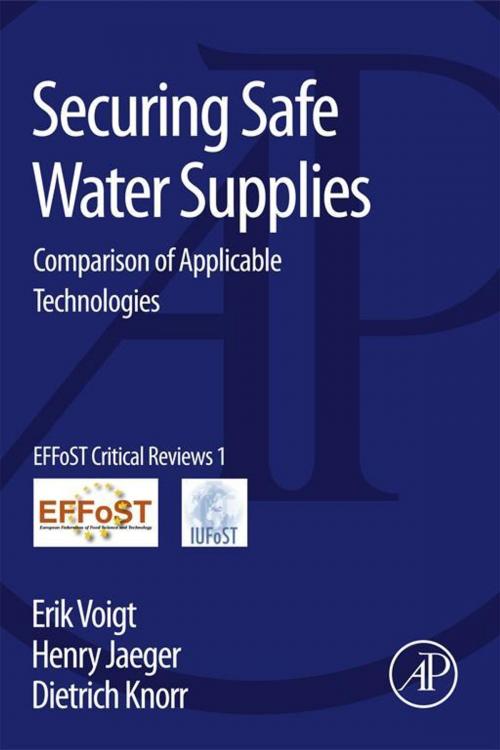Securing Safe Water Supplies
Comparison of Applicable Technologies
Nonfiction, Science & Nature, Technology, Engineering, Environmental, Food Industry & Science| Author: | Erik Voigt, Henry Jaeger, Dietrich Knorr | ISBN: | 9780124059115 |
| Publisher: | Elsevier Science | Publication: | September 27, 2012 |
| Imprint: | Academic Press | Language: | English |
| Author: | Erik Voigt, Henry Jaeger, Dietrich Knorr |
| ISBN: | 9780124059115 |
| Publisher: | Elsevier Science |
| Publication: | September 27, 2012 |
| Imprint: | Academic Press |
| Language: | English |
Available water disinfection systems rely mainly on large-scale filtration and the combination of filtration (to remove solids), and subsequent application of chemical disinfectants. This has proven to produce water of acceptable quality. Important points for application in household systems are low complexity, few training requirements, and easy transportation and distribution as well as a sufficiently high acceptance by the user.
Written and endorsed by the European Federation of Food Science and Technology this book compares a variety of purification systems. There is a growing evidence base on targeting water quality improvements to maximize health benefits, and it is believed that 4% of the global disease burden could be prevented by improving water supply, sanitation, and hygiene. Better tools and procedures to improve and protect drinking-water quality at the community and urban level, for example, through Water Safety Plans include the availability of simple and inexpensive approaches to treat and safely store water at the household-level.
- Provides single-source comparison of advantages and disadvantages relevant to the various practices of multiple water treatments
- Acknowledges the limitations of governmental interventions that need to be supplemented by individual practices such as home implementation systems
- Provides practical implementation insights and perspectives via graphs, tablesand charts that make information readily accessible and comparable
Available water disinfection systems rely mainly on large-scale filtration and the combination of filtration (to remove solids), and subsequent application of chemical disinfectants. This has proven to produce water of acceptable quality. Important points for application in household systems are low complexity, few training requirements, and easy transportation and distribution as well as a sufficiently high acceptance by the user.
Written and endorsed by the European Federation of Food Science and Technology this book compares a variety of purification systems. There is a growing evidence base on targeting water quality improvements to maximize health benefits, and it is believed that 4% of the global disease burden could be prevented by improving water supply, sanitation, and hygiene. Better tools and procedures to improve and protect drinking-water quality at the community and urban level, for example, through Water Safety Plans include the availability of simple and inexpensive approaches to treat and safely store water at the household-level.
- Provides single-source comparison of advantages and disadvantages relevant to the various practices of multiple water treatments
- Acknowledges the limitations of governmental interventions that need to be supplemented by individual practices such as home implementation systems
- Provides practical implementation insights and perspectives via graphs, tablesand charts that make information readily accessible and comparable















